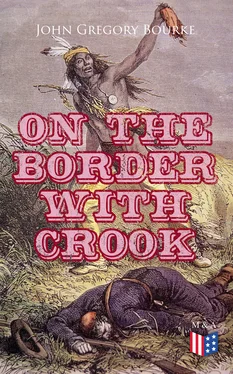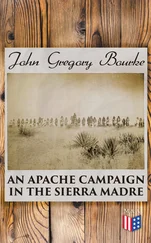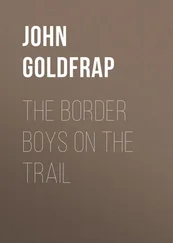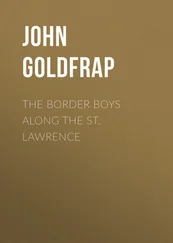But here we are. That fringe of emerald green in the “bottom” is the barley land surrounding Tucson; those gently waving cottonwoods outline the shrivelled course of the Santa Cruz; those trees with the dark, waxy-green foliage are the pomegranates behind Juan Fernandez’s corral. There is the massive wall of the church of San Antonio now; we see streets and houses, singly or in clusters, buried in shade or unsheltered from the vertical glare of the most merciless of suns. Here are pigs staked out to wallow in congenial mire—that is one of the charming customs of the Spanish Southwest; and these—ah, yes, these are dogs, unchained and running amuck after the heels of the horses, another most charming custom of the country.
Here are “burros” browsing upon tin cans—still another institution of the country—and here are the hens and chickens, and the houses of mud, of one story, flat, cheerless, and monotonous were it not for the crimson “rastras” of chile which, like mediaeval banners, are flung to the outer wall. And women, young and old, wrapped up in “rebosos” and “tapalos,” which conceal all the countenance but the left eye; and men enfolded in cheap poll-parrotty blankets of cotton, busy in leaning against the door-posts and holding up the weight of “sombreros,” as large in diameter as cart-wheels and surrounded by snakes of silver bullion weighing almost as much as the wearers.
The horses are moving rapidly down the narrow street without prick of spur. The wagons are creaking merrily, pulled by energetic mules, whose efforts need not the urging of rifle-cracking whip in the hands of skilful drivers. It is only because the drivers are glad to get to Tucson that they explode the long, deadly black snakes, with which they can cut a welt out of the flank or brush a fly from the belly of any animal in their team. All the men are whistling or have broken out in glad carol. Each heart is gay, for we have at last reached Tucson, the commercial entrepôt of Arizona and the remoter Southwest—Tucson, the Mecca of the dragoon, the Naples of the desert, which one was to see and die; Tucson, whose alkali pits yielded water sweeter than Well of Zemzen, whose maidens were more charming, whose society was more hospitable, merchants more progressive, magazines better stocked, climate more dreamy, than any town from Santa Fé to Los Angeles; from Hermosillo, in Sonora, to the gloomy chasm of the Grand Cañon—with one exception only: its great rival, the thoroughly American town of Prescott, in the bosom of the pine forests, amid the granite crags of the foot-hills of the Mogollon.
Camp Lowell, as the military post was styled, was located on the eastern edge of the town itself. In more recent years it has been moved seven or eight miles out to where the Riito is a flowing stream. We took up position close to the quartermaster’s corral, erected such tents as could be obtained, and did much solid work in the construction of “ramadas” and other conveniences of branches. As a matter of comfort, all the unmarried officers boarded in the town, of which I shall endeavor to give a succinct but perfectly fair description as it impressed itself upon me during the months of our sojourn in the intervals between scouts against the enemy, who kept our hands full.
My eyes and ears were open to the strange scenes and sounds which met them on every side. Tucson was as foreign a town as if it were in Hayti instead of within our own boundaries. The language, dress, funeral processions, religious ceremonies, feasts, dances, games, joys, perils, griefs, and tribulations of its population were something not to be looked for in the region east of the Missouri River. I noted them all as well as I knew how, kept my own counsel, and give now the résumé of my notes of the time.
The “Shoo Fly” restaurant, which offered the comforts of a home to the weary wayfarer in Tucson, Arizona, circa 1869, was named on the principle of “lucus à non lucendo”—the flies wouldn’t shoo worth a cent. Like the poor, they remained always with us. But though they might bedim the legend, “All meals payable in advance,” they could not destroy the spirit of the legend, which was the principle upon which our most charming of landladies, Mrs. Wallen, did business.
Mrs. Wallen deserves more than the hasty reference she is receiving in these pages. She was a most attentive and well-meaning soul, understood the mysteries, or some of the mysteries, of the culinary art, was anxious to please, had never seen better days, and did not so much as pretend to have seen any, not even through a telescope.
She was not a widow, as the proprieties demanded under the circumstances—all landladies that I’ve ever read or heard of have been widows—but the circumstance that there was a male attached to the name of Wallen did not cut much of a figure in the case, as it was a well-understood fact that Mrs. Wallen was a woman of nerve and bound to have her own way in all things. Consequently, the bifurcated shadow which flitted about in the corral feeding the chickens, or made its appearance from time to time in the kitchen among the tomato peelings, did not make a very lasting impression upon either the regulars or the “mealers,” the two classes of patrons upon whose dollars our good hostess depended for the support of her establishment.
One line only will be needed to lay before the reader the interior view of the “Shoo Fly.” It was a long, narrow, low-ceiled room of adobe, whose walls were washed in a neutral yellowish tint, whose floor was of rammed earth and ceiling of white muslin. Place here and there, in convenient positions, eight or ten tables of different sizes; cover them with cheap cloths, cheap china and glass—I use the term “cheap” in regard to quality only, and not in regard to the price, which had been dear enough, as everything was in those days of freighting with mule and “bull” teams from Leavenworth and Kit Carson. Place in the centre of each table a lead castor with the obsolete yellow glass bottles; put one large, cheap mirror on the wall facing the main entrance, and not far from it a wooden clock, which probably served some mysterious purpose other than time-keeping, because it was never wound up. Have pine benches, and home-made chairs, with raw-hide bottoms fastened with strings of the same material to the framework. Make the place look decidedly neat and clean, notwithstanding the flies and the hot alkali dust which penetrated upon the slightest excuse. Bring in two bright, pleasant-mannered Mexican boys, whose dark complexions were well set off by neat white cotton jackets and loose white cotton trousers, with sometimes a colored sash about the waist. Give each of these young men a fly-flapper as a badge of office, and the “Shoo Fly” is open for the reception of guests.
Napkins designated the seats of the regular boarders. “Mealers” were not entitled to such distinction and never seemed to expect it. There was no bill of fare. None was needed. Boarders always knew what they were going to get—same old thing. There never was any change during all the time of my acquaintance with the establishment, which, after all is said and done, certainly contrived to secure for its patrons all that the limited market facilities of the day afforded. Beef was not always easy to procure, but there was no lack of bacon, chicken, mutton, and kid meat. Potatoes ranked as luxuries of the first class, and never sold for less than ten cents a pound, and often could not be had for love or money. The soil of Arizona south of the Gila did not seem to suit their growth, but now that the Apaches have for nearly twenty years been docile in northern Arizona, and left its people free from terror and anxiety, they have succeeded in raising the finest “Murphies” in the world in the damp lava soil of the swales upon the summit of the great Mogollon Plateau.
Читать дальше












